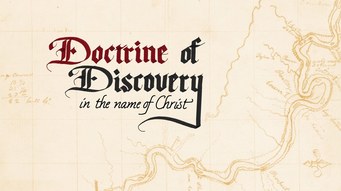
A lineage of evil . . . stretches from Constantine [in 313] to Pope Nicholas [V] to Columbus to contemporary American and European politics: the tradition of racial and religious privilege and supremacy—specifically white and Christian privilege and supremacy. . . . About forty years before 1492, Pope Nicholas V issued an official document called Romanus Pontifex . . . which serves as the basis for what is commonly called the Doctrine of Discovery, the teaching that whatever Christians “discover,” they can take and use as they wish. . . . Christian global mission is defined as to “invade, search out, capture, vanquish, and subdue” non-Christians around the world, and to steal “all movable and immovable goods” and to “reduce their persons to perpetual slavery”—and not only them, but their descendants. And notice the stunning use of the word convert: “to convert them to his and their use and profit.”
Why was I so shocked? Part of my interfaith journey has been to recognise and face up to the dark side of religion, especially my own. I am very aware of how Christianity spread on the back of colonialism, how the Church was implicated in politics, how religion was used as a unifying force in what was called the Holy Roman Empire, how Christianity and Catholicism were imposed on other cultures. So what was new in this quotation? Well, I think it was the Papal Bull – a name given to an authoritative edict from the Pope that stated so clearly the teaching that Christians can take and use as they wish anything they discover, including people whom they have converted. I had to read the edict ‘Romanus Pontifex’ issued by Pope Nicholas V in 1455 for myself and its language is shocking. It’s primarily a political document confirming the King of Portugal’s right to trade and colonise certain lands in Africa and forbidding other Christian nations from infringing these rights. And this was not a one off. A Papal Bull in 1436 gave the same rights to Castile over the Guanches people of the Canary Islands. Another in 1452 instructed the Portuguese Crown “to invade, capture, vanquish, and subdue all Saracens, pagans, and other enemies of Christ, to put them into perpetual slavery, and to take away all their possessions and property.” And another in 1493 gave Ferdinand and Isabella of Spain “full and free power, authority, and jurisdiction of every kind,” over almost all of the Americas.
All this can be summed up, I now understand, in what has come to be known as the Doctrine of Discovery – the right of Christian colonisers to the land and resources of pagan peoples, the right to kill them or enslave them if they did not convert. This is 15th century thinking but it formed the basis of the United States attitude to the North American Indians in the 19thcy and still governs US Indian Law today. I have to constantly remind myself that the human race is not very far along its evolutionary path. I’ve often heard it said that if we were to compare the life span of our universe with a calendar year, human beings only appear at three minutes to midnight on 31st December. We may be advanced technologically but in some ways we are not at all advanced in living with one another and respecting difference.
It’s not too difficult to see the sentiments of the Doctrine of Discovery at work in the world today: my truth is the only truth and yours can be ignored or even obliterated. If you do not accept my truth you have no right to a voice or to life and therefore can be killed. Deep within nations – and perhaps within individuals – there seems to be a desire for expansionism, an adventurous spirit and ambition which allows invasion of others’ space, a fear of the other which leads to enormous expenditure of time and resources on defence, a restriction of the rights of fellow citizens who do not follow the state religion, leading sometimes to their marginalisation, expulsion and even death. This is true all over the world and all religions are implicated, especially if they are allied with the State as the Catholic Church was for so much of its history.
Later today I am going to an Interfaith Peace and Reconciliation Service as part of Scotland’s Holocaust Memorial Day events. This is an opportunity to face up to the dark side of our faiths and our humanity and to acknowledge our desire for peace. It will also witness to the fact that it’s possible for faith communities to live together, to respect one another’s differences and to treat one another as brothers and sisters. I’ll be very aware of the Doctrine of Discovery as I participate in this service but also grateful that things are changing in some small way, believing that our attempts at furthering good interfaith relations can bear fruit and do take the human family further along that road of evolution towards peaceful co-existence. This is what interreligious dialogue is all about.


 RSS Feed
RSS Feed
